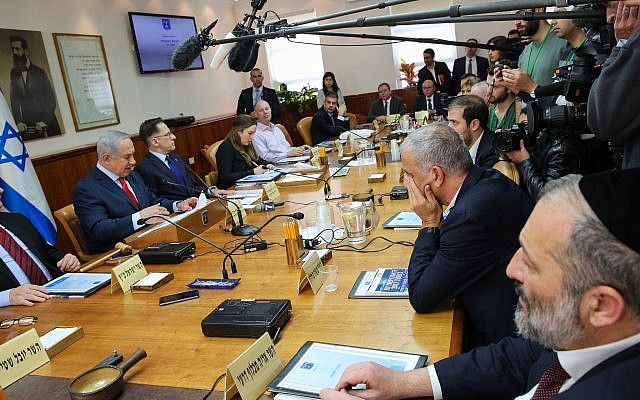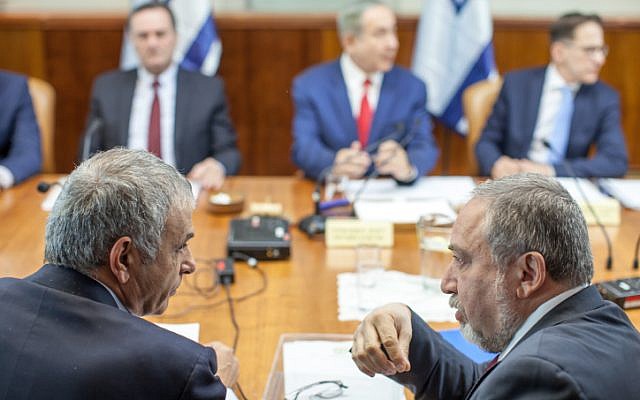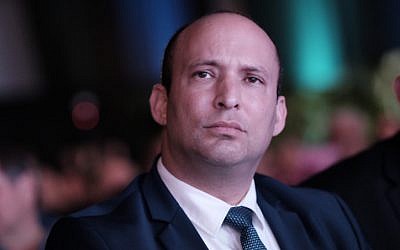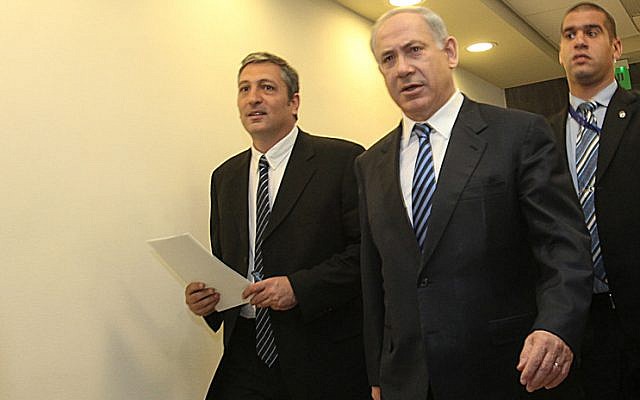Bennett says ‘there is a limit’ amid speculation that parties will be asked to commit to sticking with Netanyahu even if he is charged in bribery cases

Coalition party heads were set to meet Sunday morning in what may be their last such weekly gathering, as they struggle to find a solution to the spiraling crisis threatening elections while pointing the finger at Prime Minister Benjamin Netanyahu for pushing Israelis to the ballot box.
Netanyahu met with ultra-Orthodox coalition members on Saturday night in an ostensible effort to forge a breakthrough by meeting their demands to legislate a new conscription exemption bill and prevent snap elections over disagreements with other parties.
But after the Likud party released overnight the prime minister’s conditions for ending the standoff — full agreement from the ultra-Orthodox for a new bill which Yisrael Beytenu head Avigdor Liberman would have to commit to letting pass while Kulanu chairman Moshe Kahlon would have to vote in favor of — party leaders suggested Sunday that the prime minister is in fact driving them to new elections.

Speaking on Army Radio Sunday morning, Jewish Home chairman Naftali Bennett suggested that Netanyahu, who is beset by corruption allegations, is exploiting the crisis to call elections that would shore up his rule.
“The entire country is being dragged toward elections due to the personal threat [against the prime minister],” the education minister said.
“Afterward, I will be required to commit to a new government, with or without an indictment,” he told Army Radio, referring to possibility that Attorney General Avichai Mandelblit will press bribery charges against the prime minister within the next few months. “It’s not okay. There is a limit.”
Hardening his rhetoric against the prime minister, Bennett said that “if Netanyahu forces elections on the public for personal reasons, the public will settle a score with him and we will consider running for the premiership.” Last week the Jewish Home leader said he would only run for prime minister “after the Netanyahu era.”
Shas leader and Interior Minister Aryeh Deri said given the opposition within the coalition to the conscription bill, Netanyahu’s conditions prove that he wants elections and that negotiations are a waste of time, Army Radio reported.
Defense Minister Liberman has been adamant that he will not support any version of the bill that isn’t drafted by his own ministry. He vowed Saturday that there would be no compromise over the bill.
“In life, there are moments when you need to follow your beliefs and not what is convenient or advantageous,” he tweeted. “This is exactly that moment.”
Meanwhile, the ultra-Orthodox coalition parties have not yet walked back their threat to vote down the 2019 budget unless the legislation is approved this week exempting members of their community from the military draft. Finance Minister Kahlon has threatened to quit his post if the budget isn’t passed this week.
In an attempt to allow the parties more time to settle differences, Justice Minister Ayalet Shaked (Jewish Home) said Saturday night that a meeting of the Ministerial Committee for Legislation, which sets the legislative agenda for the week, will be pushed off from Sunday until Monday.
On Sunday she told Israel Radio that “all of the coalition parties” want a solution that doesn’t involve elections.
“The ultra-Orthodox don’t like the new proposal but they will live with it. The crisis is solvable and has a solution. We have to decide whether to bring down a right-wing government for no reason,” she said.

“But if Netanyahu demands elections, they won’t be until the end of the year,” she added, insisting that the coalition parties would only agree to a long election campaign and not a three-month stretch as is the prime minister’s rumored preference.
Netanyahu reportedly favors elections in July, while the Knesset’s current term is only set to expire near the end of 2019. A snap poll would likely mean that the attorney general’s decision on indictment would come after the ballot.
Recent weeks have seen burgeoning corruption allegations against Netanyahu following police recommendations to indict him.
In Case 1000, Netanyahu and his wife are suspected of receiving illicit gifts from billionaire benefactors, amounting to some NIS 1 million ($282,000) worth of cigars and champagne from the Israeli-born Hollywood producer Arnon Milchan and Australian resort owner James Packer, in return for certain benefits.
Case 2000 involves a suspected illicit quid-pro-quo deal between Netanyahu and Yedioth Ahronoth newspaper publisher Arnon Mozes that would have seen the prime minister weaken a rival daily, the Sheldon Adelson-backed Israel Hayom, in return for more favorable coverage from Yedioth.

Last week, a former Netanyahu family top media adviser, Nir Hefetz, became the third former close aide to the prime minister to agree to cooperate with police.
He has reportedly promised to provide police with incriminating text messages and recordings of Netanyahu and his wife in several criminal cases, including Case 4000 and Case 1000.
Netanyahu has denied any wrongdoing in any of the cases.
As reported by The Times of Israel
